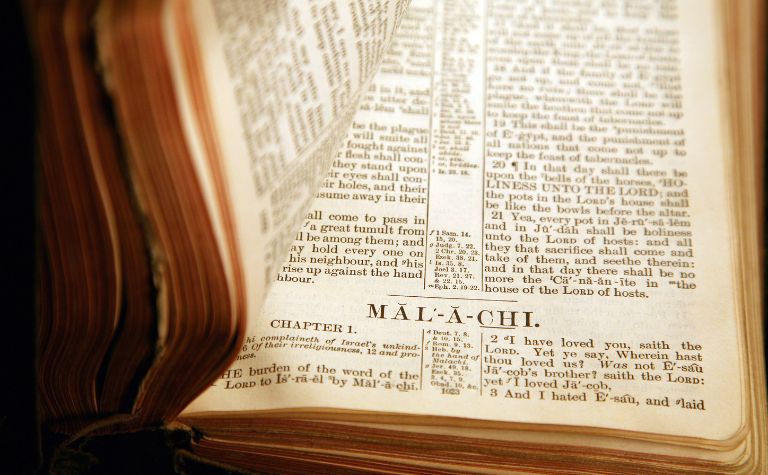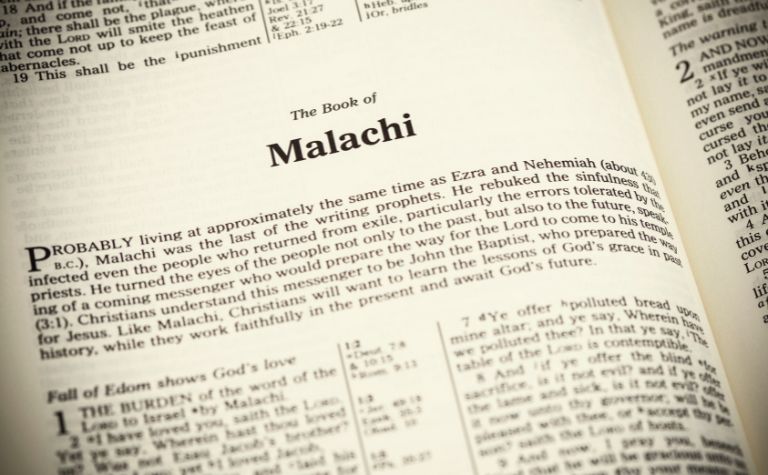The Old Testament makes up the first two-thirds of the Christian Bible. It primarily tells the story of how God chose and used the nation of Israel to be his instrument of redemption to save people from all races, languages, and cultures from sin. Many people know that Genesis is the first book of the Old Testament, which makes them curious about the last book.
Malachi is the last book of the Old Testament. It has four chapters and 55 verses. Malachi takes place about 400 before Jesus Christ. Named for its author, who was a prophet, the thirty-ninth book of the Hebrew Bible teaches readers that one day God will reward his followers and judge his enemies.
When did Malachi write his book? Who were his original readers? How does Malachi 1:4 describe God, and how does that theme manifest throughout the book? What powerful rebukes do readers find in the book? What happened between Malachi and the arrival of Jesus Christ? Keep reading to learn the answers to these questions and others.
Also, see Are There 46 Books in the Old Testament? to learn more.

The Message of Malachi
Malachi is part of the prophetic literature of the Old Testament, which comprises the last 17 books of the collection. Most scholars date the book to around 430 B.C. Malachi’s original readers were Jews who were returning to the Promised Land after being in exile for two generations.
Malachi served God in the era after Haggai and Zechariah, who have Old Testament books named after them. He was also a contemporary of Nehemiah, whose book appears in the historical section of the Old Testament. Because Nehemiah and Malachi had overlapping ministries, their books have similar themes.
| The Last 5 Books of the Old Testament |
|---|
| (35) Habakkuk |
| (36) Zephaniah |
| (37) Haggai |
| (38) Zechariah |
| (39) Malachi |
The Great King
The book of Malachi proclaims that God is a great King. Malachi 1:4 reads, “Cursed be the cheat who has a male in his flock, and vows it, and yet sacrifices to the Lord what is blemished. For I am a great King, says the Lord of hosts, and my name will be feared among the nations.” (ESV, emphasis added)
The kingship of God is a Bible-wide theme. In the context of Israel’s post-exile life, God’s people had recently been released from living under non-Israelite rulers. Then, when they returned to the Promised Land, some residents didn’t want them there, making life difficult for them.
Remembering that God is a great king helped the Israelites believe in his sovereignty over the nations. Zechariah, who ministered in the same era, also proclaimed this message.
For example, Zechariah 14:9 reads, “And the Lord will be king over all the earth. On that day, the Lord will be one and his name one.” (ESV, emphasis added).
As king, God will judge his enemies
“Behold, I send my messenger, and he will prepare the way before me. And the Lord whom you seek will suddenly come to his temple; and the messenger of the covenant in whom you delight, behold, he is coming, says the Lord of hosts. But who can endure the day of his coming, and who can stand when he appears? For he is like a refiner’s fire and like fullers’ soap.” (Malachi 3:1-2, ESV)
As king, God will reward his people
“But for you who fear my name, the sun of righteousness shall rise with healing in its wings. You shall go out leaping like calves from the stall. And you shall tread down the wicked, for they will be ashes under the soles of your feet, on the day when I act, says the Lord of hosts.” (Malachi 4:2, ESV)
Also, see Old and New Testament: Compared to learn more.

The Message and Outline of Malachi
Malachi has four chapters and 55 verses, most of which contain corrections for the Israelites. For example, he corrects the people’s doubt of God’s love (1:1-5), the priests for unacceptable worship (1:6-2:9), and men for dishonorable marriages (2:10-16).
Then, after he warns them about God’s coming judgment (2:17-3:5), he rebukes them for robbing God (3:6-12) and for speaking arrogantly against God (3:13-15).
God then promises to remember the faithful. Malachi 3:17 reads, “They shall be mine, says the Lord of hosts, in the day when I make up my treasured possession, and I will spare them as a man spares his son who serves him.” (ESV)
| Outline of Malachi |
|---|
| 1. The Six Disputes ( 1:1–3:18 ) |
| a. The Lord’s Love for Israel ( 1:1–5 ) |
| b. The Polluted Offerings and Priesthood ( 1:6–2:9 ) |
| c. Judah’s Unfaithfulness ( 2:10–16 ) |
| d. The Coming Day of Judgment ( 2:17–3:5 ) |
| e. Robbing God ( 3:6–12 ) |
| f. The Book of Remembrance ( 3:13–18 ) |
| 2. The Day of the Lord ( 4:1–6 ) |
The last chapter of Malachi promises destruction for God’s enemies and reward for his people. Malachi 4:2 reads, “But for you who fear my name, the sun of righteousness shall rise with healing in its wings. You shall go out leaping like calves from the stall.” (ESV)
Also, see How Many Chapters Are in the Old Testament? to learn more.

Between Malachi and Jesus Christ: A Timeline
Malachi ministered during the Persian period between 410 and 330 B.C. Most New Testament scholars estimate that Mary gave birth to Jesus sometime between 4-6 B.C.
The Hellenistic Period
| Date | Event |
|---|---|
| 334-323 | Alexander the Great conquers the known world |
| 323 | Alexander dies |
| 320 | Ptolemy I of Egypt conquers Jerusalem |
| 311 | Seleucus of Syria conquers Babylon |
| 226 | Antiochus III of Syria conquers the Promised Land |
| 198 | Antiochus I defeats Egypt |
| 175-164 | Antiochus IV (Epiphanes) rules Syria |
The Hasmonean Period
| Date | Event |
|---|---|
| 166-160 | Judas Maccabeus is leader |
| 160-143 | Jonathan is high priest |
| 142-134 | Simon is high priest |
| 134-104 | John Hyrcanus I expands Israel’s borders |
| 103 | Aristobulus rules |
| 102-76 | Alexander Janneus rules |
| 63 | Pompey invades the Promised Land |
The Roman Period
| Date | Event |
|---|---|
| 63-40 | Hyrcanus II leads, but under Roman rule |
| 40-37 | Parthians conquer Jerusalem |
| 37 | Herod becomes the ruler of the Promised Land |
| 19 | Herod starts to build the temple |
| 6-4 | Mary gives birth to Jesus |
| 4 | Herod dies |
| 4 | Archelaus success Herod |
Also, see Who Wrote the New Testament? to learn more.
References:
[1] NIV Study Bible
[2] Holman Illustrated Bible Dictionary
Related Questions
The New Testament is the most significant collection of writings in world history. Each gospel, letter, historical account, and sermon describe the life and ministry of Jesus of Nazareth and the...
Regular Bible reading is a valuable habit, as Scripture is God's message to people. However, the Bible's 66 distinct books, featuring various authors, settings, and themes, can make it challenging...
